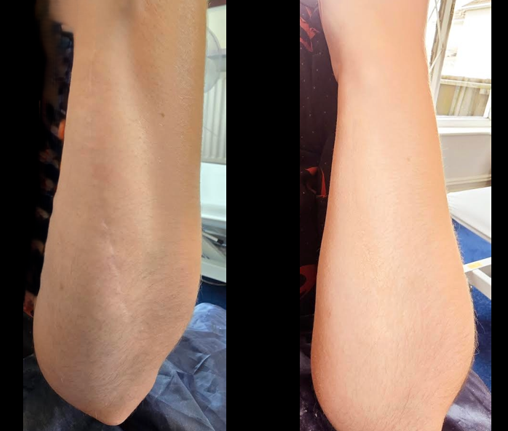 By Tonia Goman of Skin Camouflage Bristol
By Tonia Goman of Skin Camouflage Bristol
Skin camouflage is the application of highly pigmented creams and powders to conceal scarring, pigmentation changes, and certain skin conditions. While not a curative treatment, it provides individuals a way to reduce visibility of skin changes from trauma, surgery, or disease. Its relevance in medicolegal contexts is increasingly recognised, particularly where psychological injury forms part of a personal injury or clinical negligence claim.
The technique is non-invasive, temporary, and allows the client to manage how they present to the world. A correct product match can reduce contrast between scarred and surrounding skin. Skin camouflage products do not alter skin texture or the raised or indented appearance of a scar, their effect is visual only. Products used in traditional camouflage are specially formulated, pigmented creams and powders that are water-resistant, long-lasting, and provide sun protection.
Medical tattooing (or micropigmentation) is a semi-permanent technique used in some cases to enhance appearance or reduce the visibility of skin differences. While it may be a relevant option for some individuals, it is not something I offer or am trained in. My focus remains on temporary, topical approaches designed to support appearance and wellbeing without invasive procedures.
For individuals living with visible differences, especially on the face, neck, or hands, the psychological impact can be significant. People often experience self-consciousness, social withdrawal, and reduced confidence. In some cases, these effects persist long after physical healing. Skin camouflage can support emotional recovery and social reintegration, especially when clients regain the ability to engage in activities they previously avoided.
In medicolegal settings, a camouflage assessment and report provides an objective, evidence-based view of suitability. This includes an opinion on appropriate product use, replacement frequency, and estimated costs. This opinion can help inform discussions around future expenditure, particularly where ongoing or occasional product use is expected.
Not all individuals will wish to use skin camouflage. Some prefer not to conceal their scars, and others may find the application process impractical or unnecessary. Many clients use camouflage only for specific occasions — such as social events, work, or holidays. For those who do choose to explore it, camouflage can restore a measure of control, confidence, and dignity.
Instructing a specialist trained in skin camouflage with a sound understanding of skin health helps ensure recommendations are safe, appropriate, and tailored. While suitability varies, a well-evidenced report can offer impartial insight to support rehabilitation planning and legal proceedings.
For further information visit www.skincamouflage-bristol.co.uk


